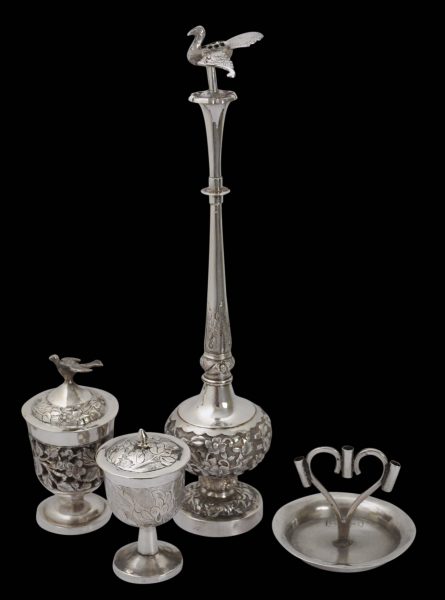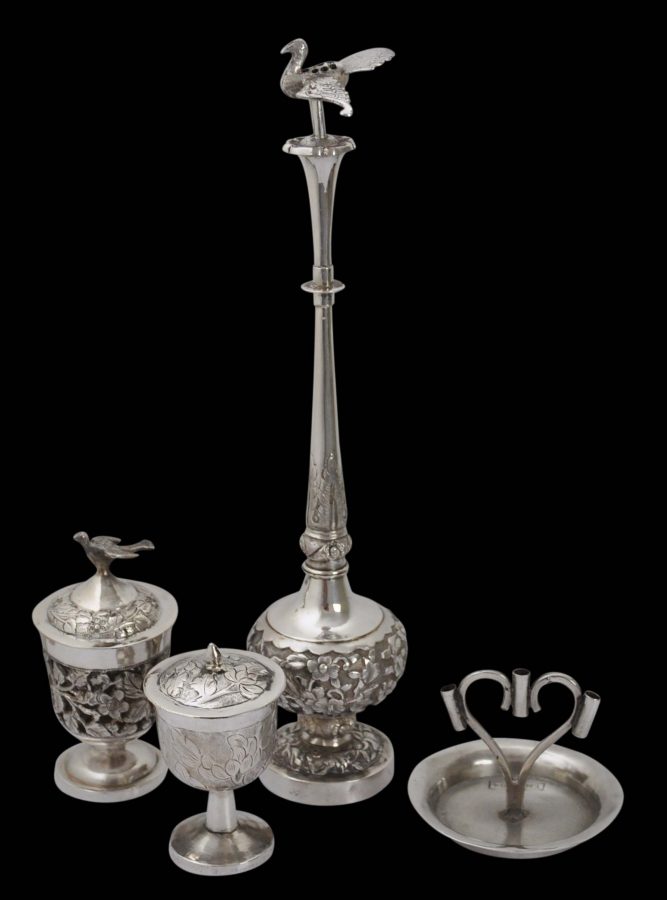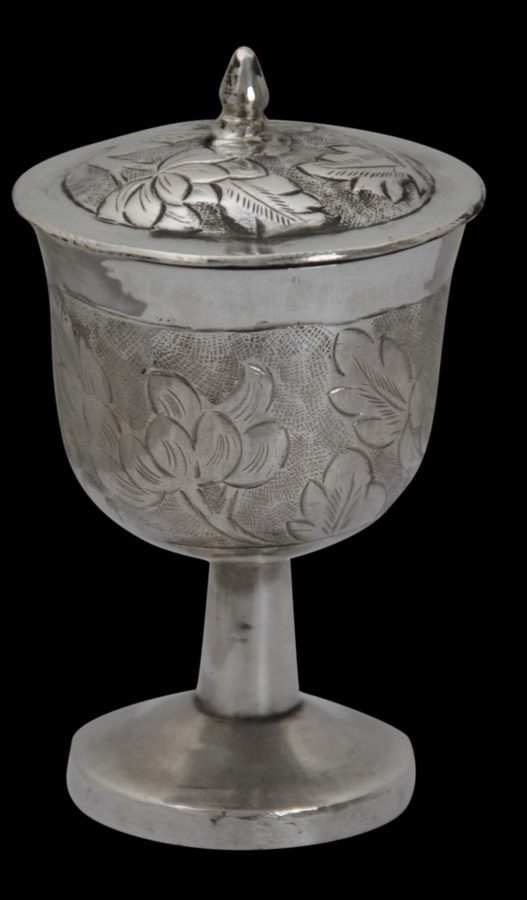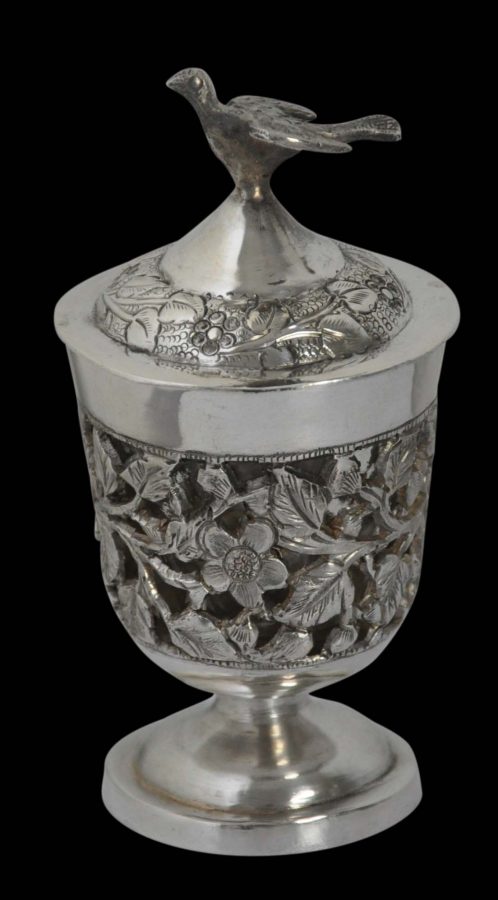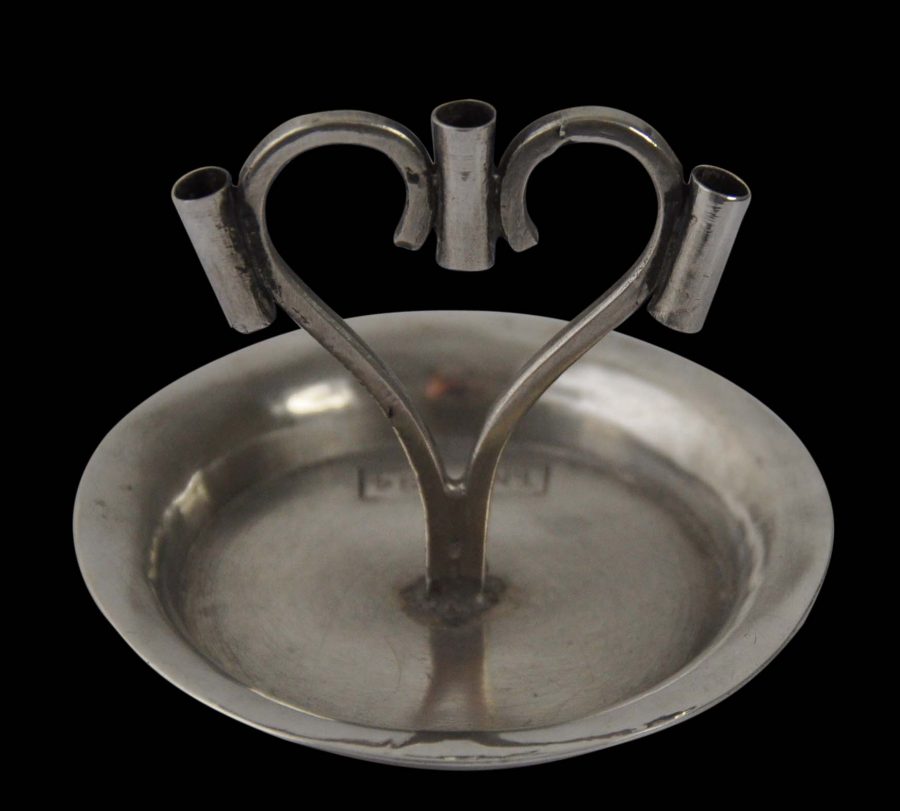Enquiry about object: 5135
Four Parsi Zoroastrian Ritual Objects in High-Grade Silver
Parsi (Parsee) People, Bombay, India 19th century
height of sprinkler: 24cm, diameter of incense tray: 7.2cm, combined weight of silver: 258g
Provenance
from a Parsi family, originally from Bombay, and now based in northern England.
This set of four ritual implements has come from a Parsi family now located in the north of England and which originally is from Bombay, India. The set is of high-grade and almost pure silver. Such silver purity was required for items to be used for ritual purposes and is a characteristic shared with local religious Hindus in India.
The four items comprise a rosewater sprinkler; a pierced covered stem cup with a hand-blown glass liner; another covered stem cup; and a small incense tray which can hold three incense sticks. All the items would have been used on a ritual ses tray.
The pierced stem cup is stamped with ‘TM94’ as is the incense tray and the other pieces are without marks. The pieces show Chinese silversmithing influence and possibly were made in China for export to the Parsi community in India. Otherwise, they were made locally in India.
The items are chased and engraved with floral and leaf motifs and the sprinkler and the pierced cup are topped with birds.
Such pieces were used along with other implements during Parsi ritual celebrations such as birthdays and navjote (coming-of-age) ceremonies.
The sprinkler held rosewater to symbolise fragrance and happiness and the stem cups held vermillion powder and betel nut slithers also for ritual purposes.
Each of the items is in excellent condition.
Parsees subscribe to Zoroastrianism, one of the world’s oldest living religions. Darius was crowned king of Persia in 522 BC, and was the first of the Achaemenid kings to be confirmed as a true follower of Zoroaster. Ahura Mazda, proclaimed by Zoroaster as God, was mentioned and celebrated as Creator in many of Darius’ speeches.
Today, probably there are fewer than 125,000 Parsees or Zoroastrians worldwide. Perhaps no more than 80,000 live in Mumbai/Bombay, a city of 14 million people, and no more than 6,000 live in Karachi in Pakistan.
Like the Chinese of Southeast Asia, the Parsees of India and Pakistan are a distinct but exceptionally successful commercial minority. By the nineteenth century, Bombay’s Parsee families dominated the city’s commercial sector, particularly in spinning and dyeing and banking.
Wealth from these activities was put into property so that by 1855, it was estimated that Parsee families owned about half of the island of Bombay. Today, India’s most prominent Parsee family is the Tata Family, founders and owners of India’s most prominent conglomerate the Tata Group.
Well off though they are as a community, the Parsees are dying out. It has been estimated that a thousand Parsees die each year in Mumbai, but only 300-400 are born. Today, one in five Mumbai Parsees is aged 65 or more. In 1901 the figure was one in fifty. Low birth rates are the main factor. Probably no Parsees remain in Burma today.
Nonetheless, many vestiges of the Parsees’ contribution to commerce in South and East Asia remain. Apart from India’s giant Tata Group, smaller examples can be seen: small change offices in Hong Kong are known locally as ‘schroffs’ after a common Parsee surname, and in Singapore the road that runs alongside that country’s finance ministry is known as Parsi Road.
References
Cama, S., ‘Parsi crafts: Gifts from Magi’, UNESCO Power of Creativity Magazine, Vol. 2, August 2008.
Godrej, P.J. & F. Punthakey Mistree, A Zoroastrian Tapestry: Art, Religion & Culture, Mapin Publishing, 2002.
Stewart, S. (ed.), The Everlasting Flame: Zoroastrianism in History and Imagination, SOAS, 2013.


